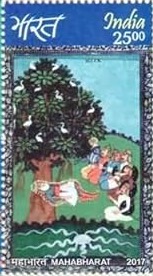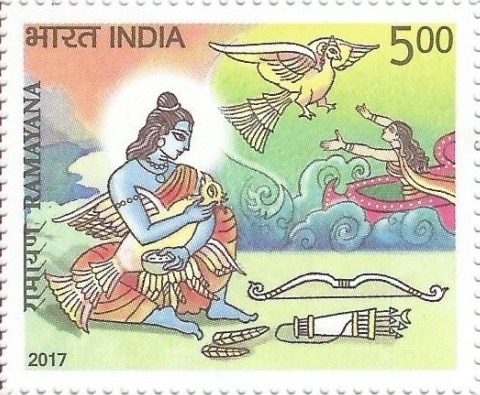No two people react to the same situation in a similar way. Here are examples of two legendary personalities who were faced with very similar situations, but their responses were diagonally apart.
It was in between Bhishma of the Mahabharata and Jatayu of the Ramayana. Both of them were confronted with character-defining assault on womanhood. One chose to die protecting the victim while the other chose to be a mute spectator of the crime.
POWERFUL or POWERLESS?

Bhishma was a powerful and capable warrior-king patriarch and if he wanted, he could have stopped the disrobing of Draupadi, the queen of the Pandavas. But he chose to be a silent witness to the act.
Whereas, Jatayu was an old and invalid bird and knew that in all probability, Ravana, the rakshasa king, would kill him. Still, he chose to try his best to protect Sita, the queen of Lord Rama.
Bhishma was powerful yet acted powerless, whereas Jatayu was powerless yet acted powerful.
‘Real power is not about physical strength but about the deep desire to help.’

ALIVE or DEAD?
Bhishma lived on after the incident but died everyday in his own conscience.
Whereas, Jatayu died once but lived eternally true to his conscience.
‘Our only constant companion is our concience – better to be true to it.’
FAME or INFAMY?
Bhishma’s name and fame went down in history because of this one act of not stopping the disrobing of Draupadi.
But Jatayu’s name and fame went high in history because of his one act of trying to save Sita.
‘Many of us are going to be mere names in history, sooner or later. Will we be equated with the bad or the good – is our choice.’
CULTURE or VULTURE?
Bhishma was supposed to be a highly cultured human but acted highly insensitively in terms of values.
Whereas, Jatayu was supposed to be a lowly, uncultured vulture but acted highly sensitively and soared the skies in values like an evolved human being.
‘One doesn’t become a human by being born as a human but only by being human.’
SPOKEN or UNSPOKEN WORDS?
Draupadi begged and pleaded for protection from Bhishma because she knew that, if someone could protect her, it was only him; yet Bhishma didn’t protect her.
Whereas, Sita didn’t even ask Jatayu for protection. She just wanted him to inform Lord Rama about her kidnapping by Ravana because she knew Jatayu was not powerful; yet Jatayu tried to protect Sita in whatever way he can.
‘The language of the heart is more powerful than the language of the words’
CLARITY or CONFUSION?
Bhishma was so confused about his royal duty that he forgot that he had a higher duty – a moral duty.
Whereas, Jatayu was so clear about his moral duty that no other duty was a consideration for him.
‘When caught up in a moral dilemma, it is best to follow the higher principles, to follow the heart because it always knows the truth.’
GOOD or BAD EXAMPLE?
Bhishma set a very bad precedent for generations to come.
Whereas, Jatayu set the most ideal precedent for generations to come.
‘If we can’t be a great example, at least let us not be a bad one.’
RELATIVE or STRANGER?
Another interesting point is that Bhishma was an elderly relative of Draupadi but acted as a total stranger in the disrobing episode.
Whereas, Jatayu was not at all related to Sita; he was a stranger to her but acted more than a dearest relative.
‘True relationship are based on connections of the heart.’
THE SAINTLY or THE WICKED?
Both Bhishma and Jatayu had a few moments to decide what to do.
Life, sometimes puts us in situations where we need to take crucial decisions in a few moments. What we decide very much depends on the kind of inner integrity we cultivate by the associations we keep.
Bhishma’s intelligence was clouded and it failed the test of life because he associated himself with the wicked-minded, selfish Kauravas.
Whereas, Jatayu’s intelligence was crystal clear and it passed the test of life because he associated himself with the saintly, selfless Lakshmana and the all-pure Lord Rama.
‘Who we are solely depends on whom we associate with.’
EMBRACE or NEGLECT?
Lord Sri Krishna was not at all happy with this attitude of Bhishma so much so that when He came as a peace messenger to Hastinapur, He didn’t even bother to look at Bhishma.
Whereas, Lord Rama was so happy with the life-sacrificing act of Jatayu that he embraced him and personally performed his final rites – a honour that even his father, Dasharatha, didn’t receive.
This recount is not meant to criticize Bhishma – he is undoubtedly a great personality –but his inaction.
When we come across injustice or a moral dilemma, we have only two options: Either close our eyes to it or do something about it — follow ‘the Bhishma way’ or ‘the Jatayu way.’
Whichever way we choose, let us remember that there will also be a result – ‘the Bhishma result’ or ‘the Jatayu result.’
Image of Bhishma on a bed of arrows was part of the set of 17 postage stamps on Mahabharata issued by India post in 2017. Image of Lord Rama comforting a dying Jatayu was part of the set of 11 postage stamps on Ramayana issued by India post in the same year.
